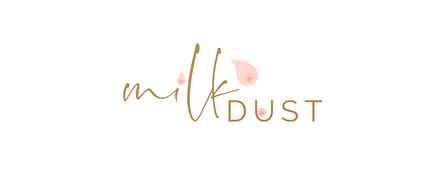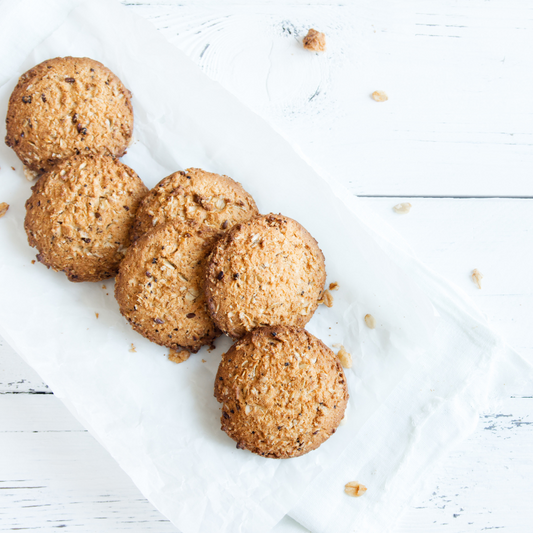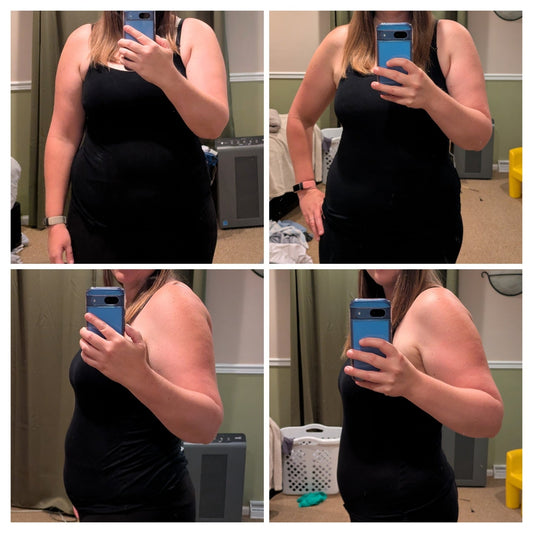Postpartum weight retention is a real thing, and gaining weight while breastfeeding does happen to many new moms. It is such a bummer for many because watching the scale go back up, when expecting the weight to fall off from all the calories you are burning breastfeeding, is really frustrating. Unfortunately for some new mothers, breasteeding and postpartum hormones cause their bodies go hold on to weight, rather than let it go. The baby weight becomes this extra weight that just won't go away. If you've been struggling with gaining weight while breastfeeding, there are some hidden reasons this is happening, and some ways you can help your body let go of weight, so you can get back to your pre-pregnancy weight.
A breastfeeding mom is required to eat enough calories for lactation. This set number is very individual for each mother. But more importantly, your body requires nutrients for proper hormonal function, and your hormones play a VERY important role in your weight retention. If hormones are out of whack, you can actually gain weight on very little calories. The best thing to do is focus on nutrient consumption for hormonal health, rather than reducing calories. For example, the stress hormone cortisol can actually cause you to gain belly fat, even if you are in a calorie defecit. Once that hormone is back to normal, your body can shed that belly fat, even if you don't reduce your calories or start exercising more. This is why eating the proper nutrients to combat postnatal depletion and nourish your hormones is so important to your postpartum weight loss journey.
Losing weight while breastfeeding is harder than it seems for many mamas. Breastfeeding does burn extra calories, but many times that extra calorie burn doesn't make an impact on weight loss. Many mamas find themselves super frustrated and giving up, after countless healthy meals, workouts and diets, only to find they are only losing milk supply. How depressing! But, there are some real reasons that breastfeeding mamas may not be able to lose weight, and these reasons need to be addressed in order to lose weight.
Our founder here at Milk Dust specializes in helping nursing mother's lose weight. We've tapped into all her knowledge to pull together everything you need to know.
Reasons Breastfeeding Is Causing You To Gain Weight:
Breastfeeding itself can cause issues with weight loss. Because there are many hormonal factors that are happening postpartum, some women's bodies don't respond well to the hormones required for lactation.These hormonal changes are a major contributing factor to weight gain, aside from lifestyle and habits you may not realize you developed during pregnancy.
Your Estrogen Is Too High:
After pregnancy, your estrogen levels are supposed to drop dramatically as other hormones increase to lactate. If this happens properly, the low estrogen levels help promote weight loss. Estrogen is the female hormone responsible for fat storage and reproduction. If breastfeeding doesn't cause your estrogen levels to drop enough, then weight loss can definitely stall. Your diet can also increase estrogen levels, which we will get into how to help lower your estrogen with your diet in a bit. Luckily some diet changes can help you reduce estrogen, lose weight and actually increase milk production.
You Aren't Burning That Many Calories:
Calorie burn is VERY subjective to your individual body. Assuming you are burning more calories doesn't mean you actually are. In THEORY, women burn more calories while breastfeeding. This doesn't mean the every mother burns exactly 500 calories a day while breastfeeding. Some mamas burn more, and some way less. Breastfeeding many not be requiring that many calories for your body, thus making it much more difficult to lose the weight. Especially if you are factoring in a calorie burn higher than what is really happening.
Your Appetite Is Very Large:
Prolactin, which increases for lactation, is also known to increase appetite. This can be a big problem for breastfeeding mamas, and throw a huge wrench in your weight loss. Especially if you are more sensitive to prolactin. Verious women have various reactions to hormonal levels, and some experience extreme hunger from prolactin. With a huge appetite, you are probably eating more than necessary to lose weight.Even your healthy diet could be too many calories because your appetite is so large.
Your Cortisol Is Very High:
Losing sleep increases cortisol levels. Cortisol can increase appetite and make you hold on to fat, especially in the belly! Some mamas get more sleep than others, and others are more sensitive to higher cortisol levels. This is really a difficult situation for breastfeeding mamas because not a whole lot can be done with a newborn. There are ways you can help manage your cortisol levels, which we will go over. These are some reasons breastfeeding in itself can cause issues with weight loss. The hormonal levels are all out of wack with a big appetite going on. But, there are also some real reasons you aren't losing weight while breastfeeding, that are actually harder to realize, but easier to fix.
Other Factors Causing Weight Gain While Breastfeeding:
Weight loss takes work, change and sometimes being uncomfortable. Sometimes it is easier to blame breastfeeding, then really look at why you aren't losing weight. The good news is that these factors are easier to control and fix.
You are overestimating your calorie burn:
Many mamas assume they are burning the most possible calories while breastfeeding. This is just an assumption, but not really a known number. Rather than try to figure out how many extra calories you are burning while breastfeeding, focus on eating healthier. Postpartum mamas have to wait until about 6 weeks to exercise again, so physical activity is often much less during the first couple months postpartum.
You are eating more than you realize:
Many mamas make healthy choices throughout the day, but forget how many less-than-healthy choices they make, or don't factor in how much they are eating. Without weighing and tracking, there isn't really a way to know how much you are eating. Without taking the time to track properly, most of the time women are assuming they are eating less than they are. It is a really good idea to monitor your calorie intake, which will also help guide you on how much you need to eat to produce enough milk for your breastfeeding baby.
You are eating too little, and not enough nutrients:
This is probably the biggest reason you aren't losing weight. Many mamas focus on eating less calories, rather than nutrient-dense calories. This is one of the main reasons we created Milk Dust protein powder. A protein shake to help new mamas get in a lot of nutrients at once, fast. Smoothies are super easy to whip up one-handed, or even just mixing Milk Dust with milk or water is a really great way to get in those much needed nutrients. If your body is lacking nutrients, it can signal your appetite and cravings. This can be totally confusing, and many mamas fight this by eating less, rather than filling up on nutrient dense foods. Fruits, veggies and lean protein are the key to weight loss, and the calories are less with these foods. This means you can eat a lot of volume and nutrients, feel full and properly nourish your body, so it can let go of fat.
You are giving into cravings more often then you realize:
Sugar is the most common craving while breastfeeding. Many mamas give into this craving throughout the day, more than they realize. Our Milk Dust protein powder and bar are specifically formulated to help with cravings! We satisfy that sweet craving with a sweet taste, but offer very little sugar, lots of protein and many essential nutrients breastfeeding mamas need! With the help of a nutritional supplement, these cravings can be managed!
You aren't drinking enough water:
Breastfeeding does require more water intake. Drinking plenty of water is important to your fluid levels are important because breast milk is a liquid! Often times, dehyrdation can be confused for low-energy and hunger. Sometimes drinking an electrolyte supplement can also be super helpful.
Easy Ways To Solve Your Weight Loss Problems While Breastfeeding:
Eat more nutrient-dense foods:
If you've read any of our posts, you may be tired of hearing this, but it WILL HELP! Focus on fruits, veggies, lean proteins and beans as the main source of every meal or snack. This does work, and if you need more of a plan, please jump on our free, 10-day detox plan. It has recipes, a plan, and is only 10 days! Many mamas have lost anywhere from 2-11 lbs in just 10 days on this plan! We have a free lactation smoothie recipe book you can download too, so you can get started on some amazing, weight loss smoothies that also boost milk supply! If you struggle with getting in nutrients, try our protien powder or bars as a quick and simple thing to get in all the nutrients you need, as well as the milk-boosting herbs you need!
Use lactation-boosters:
If you are struggling with milk supply, making it hard to stick to a healthier diet, use herbal boosters! Of course our lactation bars and protein powder have amazing reviews for increasing milk supply (just check Amazon for the protein powder or Instagram for both!), but you can also try various teas and supplements to boost your milk supply, so you don't have to resort to food.
Try walking to reduce cortisol:
Breastfeeding mamas have high cortisol levels, and then jumping into an intense workout can actually increase cortisol levels. Try adding in more walking to your day, rather than intense workouts to calm your body down. Focus on total steps per day, rather than getting in a HIIT workout to help increase your calorie burn overall. Walking also burns calories and uses fat stores for fuel, so if you are eating in a small calorie deficit and adding walking, you can reduce the number of fat cells in your body.
Reduce refined carbohydrates and sugar to manage Estrogen:
Eating refinded carbohydrates and extra sugar can increase estrogen levels, signaling for more fat storage. Higher fat percentage can actually cause more estrogen, which makes a seriously viscious cycle. By eliminating breads, crackers, chips, granola bars and other high-carb and sugar foods, you can reduce your insulin levels and help reduce your estrogen levels. Whole grains, sprouted grains and gluten-free options are mostly better choices. Often times, by eating fruit instead, you are eating less calories, getting more nutrients, and also still getting something sweet to help curb that craving. Definitely try one of our lactation bars instead of a granola bar! These will reduce cravings, satisfy your sweet tooth, provide you with protien and milk-boosting herbs and ultimately help you lose weight! We hope this post helps you see exactly what is going when you can't lose weight while breastfeeding. There are many reasons breastfeeding can throw a wrench in your weight loss, and there are usually some honest reasons mamas need to see in order to make positive changes. Make sure to grab a sample pack of our Milk Dust lactation protein powder, so you can see if it works for you to help you keep that milk supply up and lose the weight.
If you suffer low milk supply, you can still lose weight:
A low milk supplyl does not need to stop you from losing weight while breastfeeding. Many times, new mothers with a low milk supply eat more than necessary to try to increase their supply, when it isn't calories that are needed. This causes a slow weight gain, and still a low milk supply. Rather than eating more, try eating the right nutrients (found in Milk Dust!), and use milk supply boosters like the herbs found in Milk Dust. These will help balance hormones properly, rather than just boost blood sugar. Try to determine your milk supply by your baby's birth weight and body weight. Your baby's healthcare provider will help you determine if your milk supply is really low (meaning baby needs more), or if you are just stressed about pumping a certain amount.
We have a lot of resources on how to increase your milk supply that won't make you gain weight, as well as a lot of healthy recipes for you to increase supply, yet keep up with your weight loss goals. Getting to a healthy weight the healthy way is really important to your health overall.



